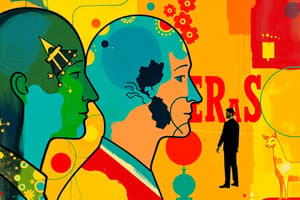Podcast
Questions and Answers
Which type of power is derived from a leader's official position within an organization?
Which type of power is derived from a leader's official position within an organization?
- Referent power
- Reward power
- Legitimate power (correct)
- Expert power
Which leadership trait is associated with being consistent and dependable?
Which leadership trait is associated with being consistent and dependable?
- Openness
- Consistency (correct)
- Competence
- Integrity
What does trait theory suggest about successful leaders?
What does trait theory suggest about successful leaders?
- They often use autocratic leadership styles.
- They delegate all decision-making tasks.
- They possess specific inherent traits. (correct)
- They rely solely on reward power.
Which behavioral leadership theory emphasizes the balance of structuring roles and considering employee needs?
Which behavioral leadership theory emphasizes the balance of structuring roles and considering employee needs?
What is a key characteristic that distinguishes employee-centered behavior from job-centered behavior in leadership?
What is a key characteristic that distinguishes employee-centered behavior from job-centered behavior in leadership?
Which leadership model aligns with predicting success through analyzing leader behaviors rather than traits?
Which leadership model aligns with predicting success through analyzing leader behaviors rather than traits?
What aspect of leadership involves the distribution of tasks and authority among team members?
What aspect of leadership involves the distribution of tasks and authority among team members?
Which component of leadership typically stresses the importance of leaders being approachable and communicative?
Which component of leadership typically stresses the importance of leaders being approachable and communicative?
What is a primary function of leadership in managing change?
What is a primary function of leadership in managing change?
How do leaders differ from managers in terms of influence?
How do leaders differ from managers in terms of influence?
Which statement best captures the essence of leadership?
Which statement best captures the essence of leadership?
In contrast to leadership, what do managers primarily focus on?
In contrast to leadership, what do managers primarily focus on?
Which of the following best differentiates leaders and managers?
Which of the following best differentiates leaders and managers?
What is an essential skill that leaders need to effectively manage change?
What is an essential skill that leaders need to effectively manage change?
What role does motivation play in leadership?
What role does motivation play in leadership?
Which activity is most characteristic of a leader's role compared to a manager's?
Which activity is most characteristic of a leader's role compared to a manager's?
Which leadership style focuses on serving and empowering followers rather than seeking power or status?
Which leadership style focuses on serving and empowering followers rather than seeking power or status?
Which theory includes the Least Preferred Co-worker (LPC) theory?
Which theory includes the Least Preferred Co-worker (LPC) theory?
What is the primary difference between transactional and transformational leadership?
What is the primary difference between transactional and transformational leadership?
Which leadership theory is characterized by leaders possessing a magnetic personality that inspires followers?
Which leadership theory is characterized by leaders possessing a magnetic personality that inspires followers?
Which of the following is NOT a characteristic considered in contingency theories?
Which of the following is NOT a characteristic considered in contingency theories?
What aspect of leadership does emotional intelligence primarily relate to?
What aspect of leadership does emotional intelligence primarily relate to?
Transformational leadership aims to raise leaders and followers to which of the following?
Transformational leadership aims to raise leaders and followers to which of the following?
In which leadership style do leaders primarily motivate followers through rewards?
In which leadership style do leaders primarily motivate followers through rewards?
Flashcards are hidden until you start studying
Study Notes
What is Leadership?
- Leadership involves influencing, inspiring, and motivating others to achieve goals.
- Leaders provide vision and direction, aligning and inspiring people to follow that vision.
- Key distinction: managers operate based on their position, while leaders gain influence through their actions.
- Leaders manage change, contrasted with managers who handle complexity.
- Leadership differs from management in key areas:
- Setting direction vs. planning and budgeting
- Aligning people vs. organizing and staffing
- Motivating vs. controlling and problem-solving
- Sources of power in leadership include:
- Legitimate power
- Reward power
- Referent power
- Expert power
- Essential characteristics of strong leaders encompass:
- Integrity
- Competence
- Consistency
- Loyalty
- Openness
Leadership Theories
- Trait theory posits that successful leaders exhibit different behaviors than unsuccessful ones.
- Notable behavioral approaches include:
- Iowa's autocratic vs. democratic styles
- Ohio State University's initiating structure and consideration
- Michigan's job-centered vs. employee-centered behaviors
- Predicting leadership success requires considering situational variables such as:
- Nature of the work
- External environment
- Characteristics of followers
- Contingency theories encompass models like:
- Least Preferred Co-worker (LPC) theory
- Path-Goal theory
- Situational Leadership theory
Contemporary Leadership Styles
- Charismatic leadership is driven by leaders possessing magnetic personality traits that inspire and motivate followers.
- Servant leadership focuses on empowering followers, prioritizing their needs over personal power or status.
- Transactional leadership revolves around an exchange of rewards for compliance.
- Transformational leadership elevates both leaders and followers to higher levels of morality and motivation.
- Emotional intelligence is crucial in leadership, involving the awareness and management of one’s feelings and emotions to inform actions and decisions.
Studying That Suits You
Use AI to generate personalized quizzes and flashcards to suit your learning preferences.




